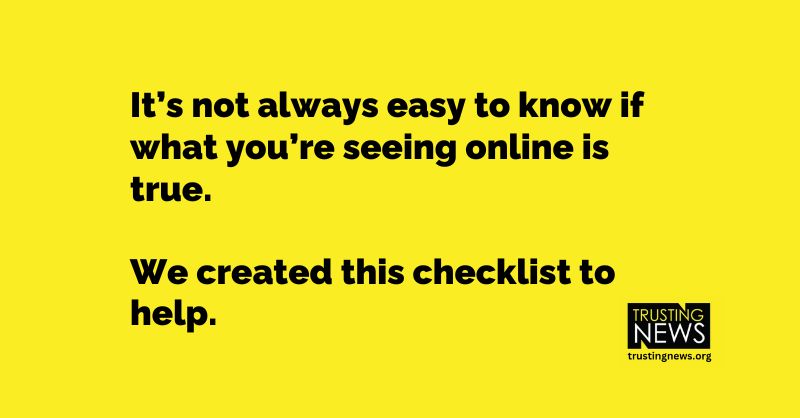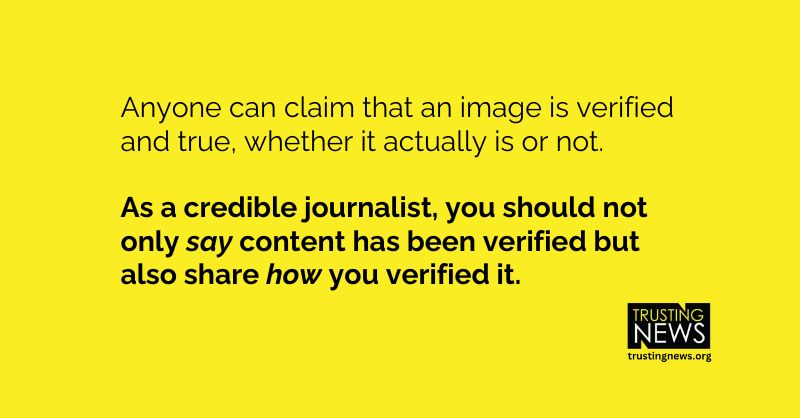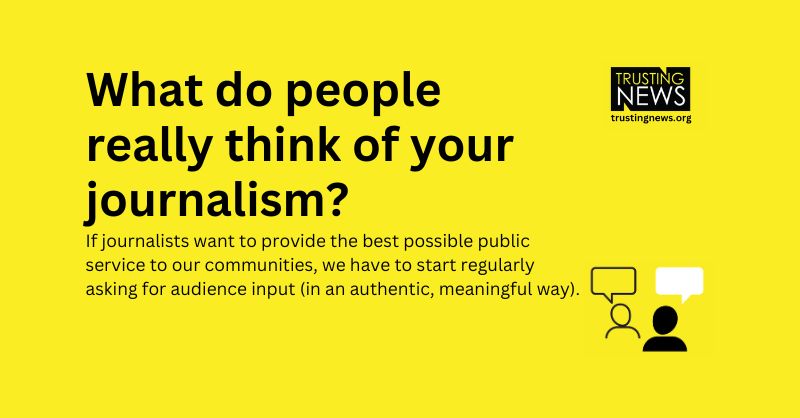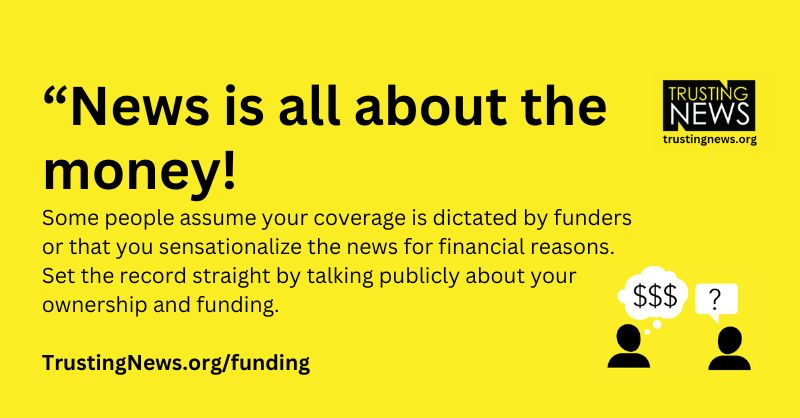
Want to get this Trust Tips newsletter in your inbox each Tuesday? Subscribe here. Right after November’s presidential election, I saw a post on X that shared this sentiment: Journalists should celebrate Trump’s win because they’ll get rich from all their coverage about him. At the beginning of the COVID-19 pandemic, many newsrooms faced a […]
Trust Tips: Respond to accusations that money influences news
Want to get this Trust Tips newsletter in your inbox each Tuesday? Subscribe here.
Right after November’s presidential election, I saw a post on X that shared this sentiment: Journalists should celebrate Trump’s win because they’ll get rich from all their coverage about him.
At the beginning of the COVID-19 pandemic, many newsrooms faced a similar accusation: that coverage was inflating the risk of the virus to stir public fear and increase viewership, which would in turn increase revenue.
The assumption behind these criticisms is that journalists sensationalize or otherwise change coverage in order to make money. And with Trump’s incoming administration, your newsroom may get complaints that you’re just covering what Trump says or does to get more clicks, higher ratings — and ultimately, money.
How newsrooms make money is understandably confusing for many people, especially when there’s some truth in those complaints. Some newsrooms DID get a bump in viewership and subscriptions as a result of Trump’s first presidential campaign and presidency, and some might see a bump again.
Whether or not it’s true for your newsroom, you have a chance to earn trust by getting on the record about how you make money and how those revenue streams do or don’t impact your coverage. By having information about your finances public and ready to share, you’ll be able to quickly respond to complaints or comments that might arise.
>> We just published a new Trust Kit that walks you through how to get on the record about your funding and ownership and includes language your newsroom can copy to ask for public support. Check it out here!
3 steps for getting clear about your funding
1. Explain your funding and business model
As much as you’re able to, get clear about how you make money. Take a look at how The Cap Times did this in a newsletter, where they broke down the newsroom’s budget, including how many salaries are paid by readers.
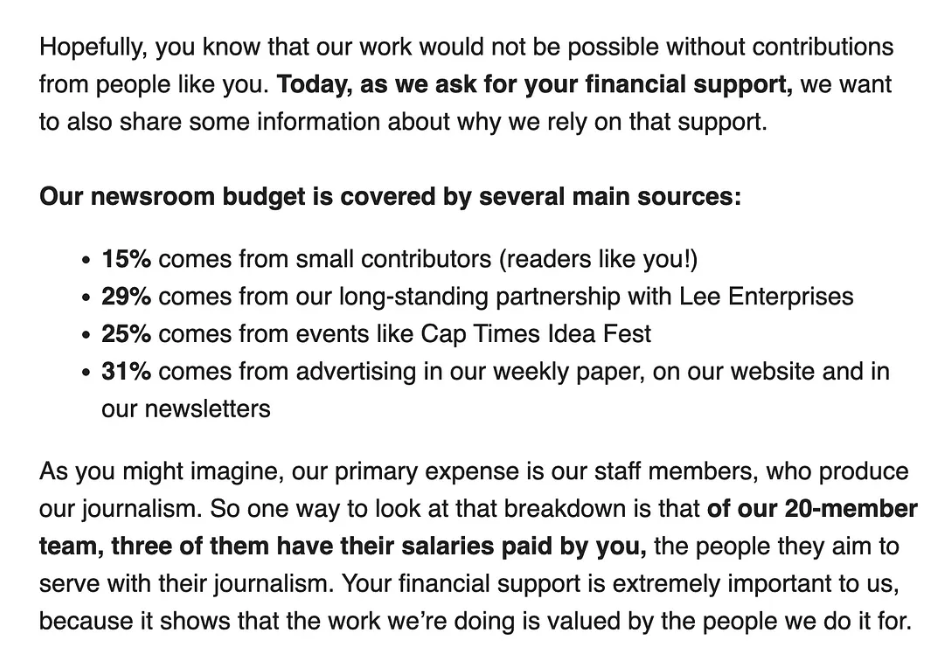
You may not be allowed to get as detailed as the above example, but you could share something as general as: Our sources of revenue include advertising, grants, subscriptions, donations, etc. Here’s how AfroLA does this by just listing all its sources of revenue.
2. Explain how funding does (or doesn’t) influence coverage.
Acknowledge any influence outside funders might have on your coverage. That could be grant funding you receive for specific beat reporting; a fellowship that pays for a reporter; or prioritizing content paying subscribers want. Talk about how you’ll handle any possible conflict of interest. Share how you’ll disclose when you report on funders — and that you’ll still be critical and pursue the facts. Then, be sure to share why people can trust your organization’s integrity (we’re telling you the truth and will stick to this even if tricky situations arise!). Link to any policies and examples that highlight you stick to your ethics.
We have disclosure examples you can copy and adapt in our Funding Trust Kit here.
3. Talk about the cost of your journalism.
Many people have the perception that journalism is, and should be, free. And there is indeed a lot of free information out there, leading many people to not consider the need to pay for news. But with many newsrooms financially struggling, some newsrooms are enacting stricter paywalls, subscriber-only content or producing sponsored ad content to help pay the bills.
If your newsroom charges money to access content, start talking publicly about why those measures are in place. Use it as an opportunity to explain why you rely on financial support from the public. This Trust Kit has sample language you can copy and adapt to help you ask your audience for financial support.
Copy this language: Address misconceptions about sensationalism
With some people believing news outlets intentionally sensationalize the news or stoke fear to increase viewership, it’s important to address this when it comes up with your audience to show you’re willing to be transparent.
Here’s an example of how former WCPO director Mike Canan talked about this during the COVID-19 pandemic, sharing that the ethics of the station were not swayed by pageviews or ratings.
Below we included some language you can copy and adapt to help you explain this to your audience. Feel free to add it directly into coverage, share it in social posts, or use it to help respond to complaints or questions you may receive.
Sample explainer: We know some news outlets might intentionally sensationalize news stories for profit, but that’s not the case at [outlet name]. Yes, we do pay attention which stories resonate most with you because our business model depends on our ability to provide coverage that is consistently interesting, useful and valuable to you. Part of the way we gauge that is by monitoring which stories get clicked on and shared most. However, it would take significant spikes in advertising (or ratings) to influence our overall revenue. And at [outlet name], revenue considerations simply do not take priority over meaningful public service.
If you have questions or concerns about getting on the record about the financial side of journalism — or if you use this language and are willing to share an example! — reach out to our team at info@trustingnews.org.
At Trusting News, we learn how people decide what news to trust and turn that knowledge into actionable strategies for journalists. We train and empower journalists to take responsibility for demonstrating credibility and actively earning trust through transparency and engagement. Learn more about our work, vision and team. Subscribe to our Trust Tips newsletter. Follow us on Twitter and LinkedIn.

Project manager Mollie Muchna (she/her) has spent the last 10 years working in audience and engagement journalism in local newsrooms across the Southwest. She lives in Tucson, Arizona, where she is also an adjunct professor at the University of Arizona’s School of Journalism. She can be reached at mollie@trustingnews.org and on Twitter @molliemuchna.

